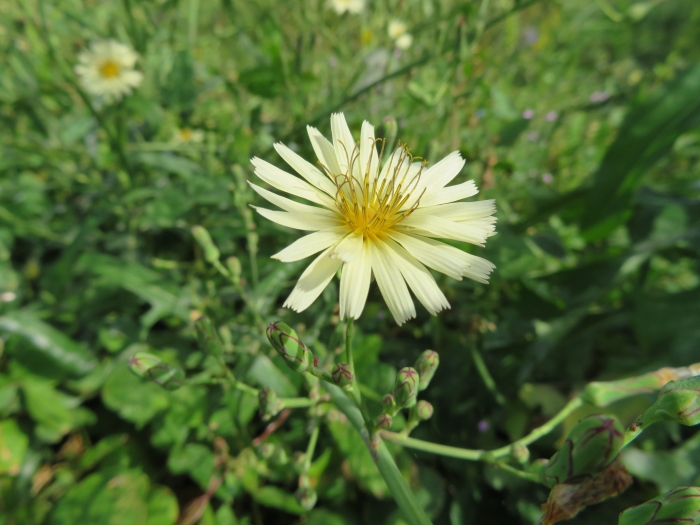Indian Lettuce
(Lactuca indica)
Indian Lettuce (Lactuca indica)
/
/

© belvedere04
CC BY 4.0
Image By:
© belvedere04
Recorded By:
Copyright:
CC BY 4.0
Copyright Notice:
Photo by: © belvedere04 | License Type: CC BY 4.0 | License URL: http://creativecommons.org/licenses/by/4.0/ | Uploader: belvedere04 | Publisher: iNaturalist |

























Estimated Native Range
Summary
Lactuca indica, commonly known as Indian lettuce, is a biennial herb that is native to a variety of habitats including open woodlands, forest edges, and disturbed areas in Asia, especially China. It can grow up to 79 inches tall and has a variable leaf shape, ranging from lobed to unlobed, with a slightly bitter taste. The plant produces small, white to pale yellow ray florets that bloom from summer to early autumn, though the flowers are not particularly showy. Indian lettuce is often found in moist, fertile soils and can tolerate partial shade.
Indian lettuce is valued for its edible young leaves, which can be used in salads or cooked as greens, offering a mild to slightly bitter flavor. It is also cultivated as fodder for livestock and aquaculture in Asia. In traditional medicine, it is used to aid digestion and has a history of use as a cooling agent to treat fevers and inflammation. While it is not commonly grown in Western gardens, it can be an interesting addition to edible gardens or as a part of a medicinal herb collection. It requires consistent moisture and can thrive in loamy soils with good drainage. Indian lettuce can become weedy if not managed properly and may self-seed prolifically in favorable conditions. It is not known to have significant disease or pest issues, but gardeners should be aware of its potential to spread.CC BY-SA 4.0
Indian lettuce is valued for its edible young leaves, which can be used in salads or cooked as greens, offering a mild to slightly bitter flavor. It is also cultivated as fodder for livestock and aquaculture in Asia. In traditional medicine, it is used to aid digestion and has a history of use as a cooling agent to treat fevers and inflammation. While it is not commonly grown in Western gardens, it can be an interesting addition to edible gardens or as a part of a medicinal herb collection. It requires consistent moisture and can thrive in loamy soils with good drainage. Indian lettuce can become weedy if not managed properly and may self-seed prolifically in favorable conditions. It is not known to have significant disease or pest issues, but gardeners should be aware of its potential to spread.CC BY-SA 4.0
Plant Description
- Plant Type: Herb
- Height: 1-3 feet
- Width: 0.5-1 feet
- Growth Rate: Moderate
- Flower Color: Yellow
- Flowering Season: Summer
- Leaf Retention: Semi-deciduous
Growth Requirements
- Sun: Full Sun
- Water: Medium
- Drainage: Medium
Common Uses
Border Plant, Edible*Disclaimer: Easyscape's listed plant edibility is for informational use. Always verify the safety and proper identification of any plant before consumption., Low Maintenance
Natural Habitat
native to a variety of habitats including open woodlands, forest edges, and disturbed areas in Asia, especially China
Other Names
Common Names: Kuwai Lettuce, Laiteron, Lastron, Wild Lettuce
Scientific Names: , Lactuca indica, Brachyramphus heyneanus, Brachyramphus sinicus, Brachyramphus sonchifolius, Brachyramphus taraxacoides, Brachyrhamphus sinicus, Chondrilla indica, Chondrilla racemosa, Chondrilla sonchifolia
GBIF Accepted Name: